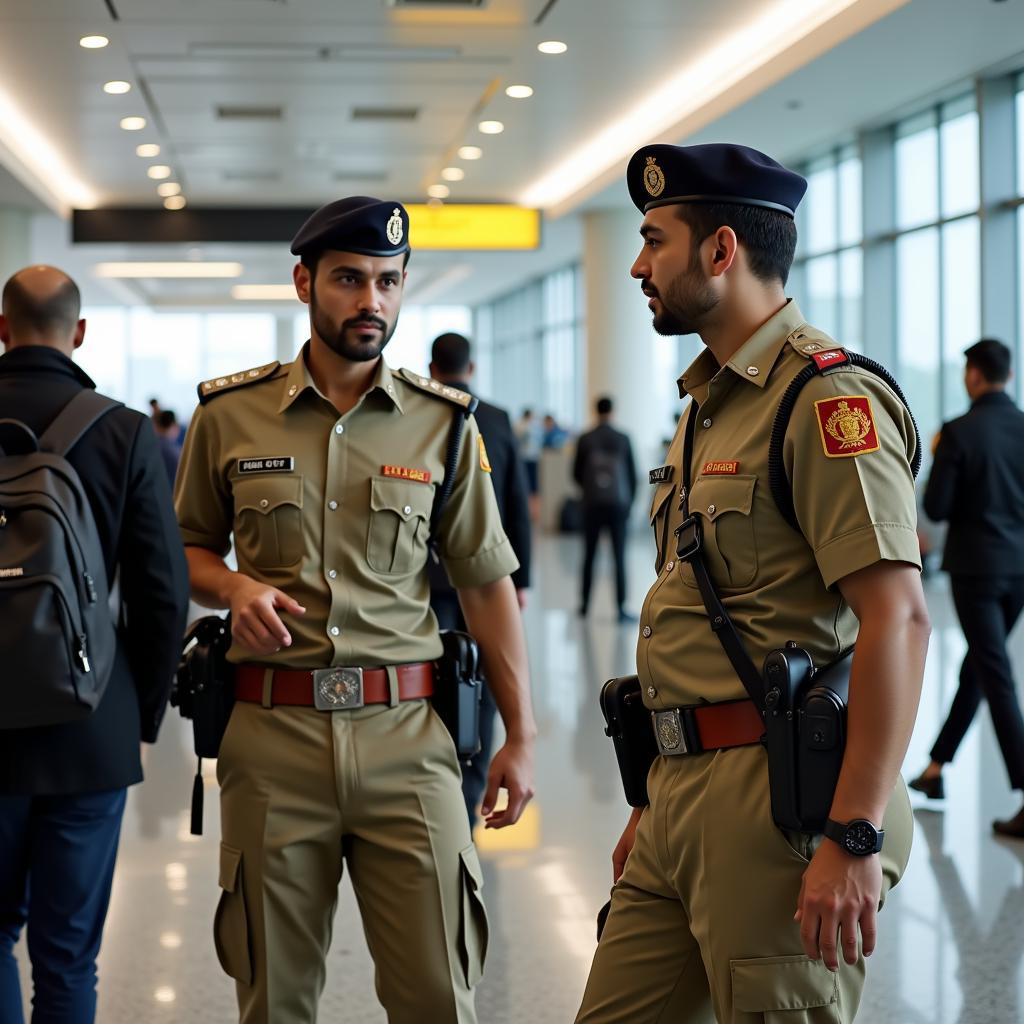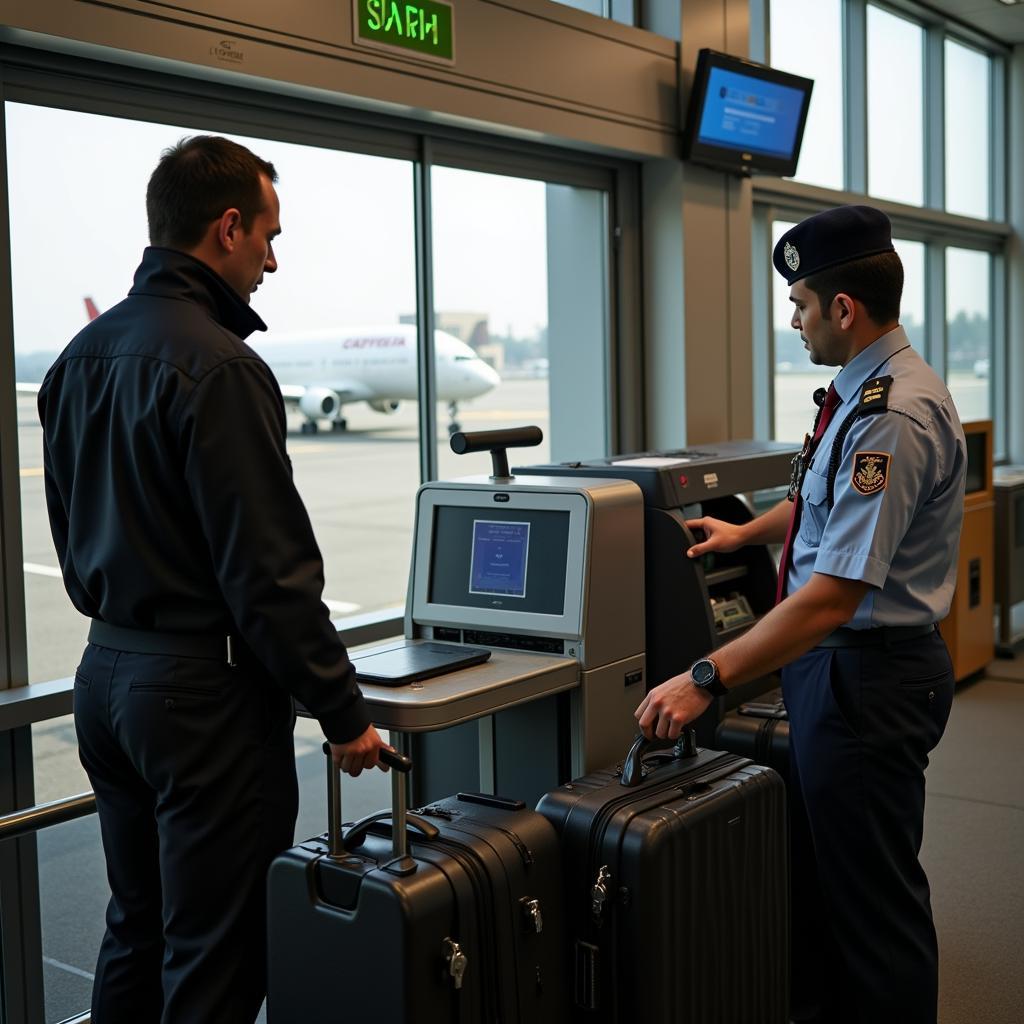The Central Industrial Security Force (CISF) plays a crucial role in ensuring the safety and security of airports in India. This article delves into the responsibilities, training, and impact of the CISF in maintaining a secure airport environment for travelers and staff. We’ll explore how they combat threats, manage emergencies, and contribute to the smooth functioning of air travel. cisf airport security
The Importance of CISF Presence in Airports
Airport security is a complex and multifaceted undertaking, requiring specialized personnel and procedures. The CISF, a paramilitary force under the Ministry of Home Affairs, is tasked with safeguarding vital installations, including airports. Their presence is paramount in preventing acts of terrorism, smuggling, and other criminal activities. This specialized force utilizes a combination of intelligence gathering, surveillance, and access control to maintain order and protect critical infrastructure within the airport ecosystem.
 CISF officers patrolling an airport terminal
CISF officers patrolling an airport terminal
Their presence not only deters potential threats but also instills confidence among passengers and airport staff. The CISF’s highly visible presence acts as a deterrent and reassures passengers about their safety. They are trained to handle various situations, from routine security checks to responding to emergencies like bomb threats or hijacking attempts.
Key Responsibilities of CISF at the Airport
The CISF’s responsibilities at the airport extend beyond simply patrolling the terminals. Their duties include:
- Passenger and Baggage Screening: CISF personnel operate X-ray machines and conduct physical checks of passengers and their baggage to detect prohibited items.
- Access Control: They monitor entry and exit points, ensuring only authorized individuals access secure areas.
- Perimeter Security: The CISF patrols the perimeter of the airport, preventing unauthorized access and intrusions.
- Surveillance and Monitoring: Using CCTV cameras and other surveillance equipment, they monitor activities within the airport premises.
- Emergency Response: They are trained to handle a wide range of emergencies, including bomb threats, hijackings, and medical emergencies.
 CISF officer checking passenger baggage
CISF officer checking passenger baggage
Specialized Training for CISF Airport Personnel
CISF personnel undergo rigorous and specialized training to prepare them for the demanding airport environment. Their training includes:
- Security Procedures and Protocols: They are trained in the latest security procedures, including passenger and baggage screening, access control, and emergency response protocols.
- Weapons and Equipment Handling: CISF officers are proficient in handling various weapons and security equipment, including firearms, X-ray machines, and metal detectors.
- Crowd Management and Control: They are trained to manage large crowds effectively, especially during peak travel times.
- Legal and Ethical Considerations: Their training emphasizes legal and ethical considerations related to security operations.
airport cisf provides a more in-depth look at the training and qualifications of CISF personnel.
What is the Role of CISF at Airport Security Checkpoints?
Airport security checkpoints are crucial for identifying potential threats. At these checkpoints, CISF personnel are responsible for:
- Verifying Travel Documents: They check passengers’ boarding passes and identification to ensure they are authorized to travel.
- Screening Passengers and Baggage: Using X-ray machines and other equipment, they screen passengers and their baggage for prohibited items.
- Conducting Physical Searches: When necessary, they conduct physical searches of passengers and their baggage.
- Maintaining Order and Efficiency: They ensure the smooth and efficient flow of passengers through the security checkpoint.
cisf airport sector explores the specific security measures employed by the CISF. The airport sector cisf link offers additional resources on this topic.
Conclusion: The Integral Role of CISF in Aviation Security
The CISF plays a vital role in ensuring the safety and security of airports in India. Their specialized training, comprehensive responsibilities, and unwavering dedication contribute significantly to the smooth and secure operation of air travel. Their presence acts as a deterrent to potential threats and instills confidence among passengers. cisf airport sector ig name might offer insights into their social media presence. The CISF is instrumental in safeguarding our airports and protecting the millions of passengers who rely on air travel every year.
FAQ
- What does CISF stand for? Central Industrial Security Force.
- Who controls CISF at airports? The Ministry of Home Affairs.
- What is the main duty of CISF at airports? To ensure the safety and security of airports and passengers.
- What training do CISF officers receive for airport security? They undergo specialized training in security procedures, weapons handling, crowd management, and legal and ethical considerations.
- What are some of the key responsibilities of CISF at airports? Passenger and baggage screening, access control, perimeter security, surveillance, and emergency response.
- How does CISF contribute to a safer airport environment? By deterring threats, managing emergencies, and enforcing security protocols.
- What is the role of CISF at airport security checkpoints? Verifying travel documents, screening passengers and baggage, conducting physical searches, and maintaining order.
For further assistance, please contact us at:
Phone: +13089626264
Email: [email protected]
Address: 404 Bothwell St, Oxford, NE 68967, USA.
We have a 24/7 customer service team.

